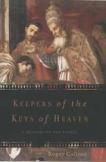The Oldest Living Institution
One may question the need for a new one-volume history of the papacy so soon after Eamon Duffy’s widely acclaimed Saints and Sinners (1997), but Roger Collins’s book can stand on its own merits. Although Keepers of the Keys of Heaven lacks Duffy’s literary panache, it is a well-researched and eminently readable account of the history of the oldest living institution in the Western world. The author’s spartan prose, reminiscent of the style of J. N. D. Kelly’s classic Oxford Dictionary of the Popes, enables him to condense an enormous amount of information into 550 pages, including 39 pages of endnotes.
A seasoned historian, author of several books on medieval Europe and research fellow at the University of Edinburgh, Collins consistently demonstrates an evenhanded approach to the most controversial issues in papal history. An unusual and welcome feature of this book is the author’s penchant for interlacing his narrative with a running evaluation of his sources, inviting the reader to share his own role as scholarly detective.
This technique also enables Collins to explain the complicated and not necessarily rious role of forged documents in the early centuries of papal history. Unaware of their tainted origins, later generations often accepted these forgeries in good faith and used them as the basis for church reform. For example, the golden age that Leo IX and his advisors attempted to restore in the 11th century was largely an illusion concocted from spurious sources, but it led to one of the great reform movements in church history.
Collins has a keen eye for the apposite quotation that suggests a contemporary reference. Bernard of Clairvaux offered a succinct definition of collegiality when he told his former pupil, Pope Eugenius III, that the pope was “not the lord of the bishops, but one of them.” He also warned Eugenius that one of his cardinals was surrounding himself with handsome young men and showering them with favors. Contemporary enthusiasm for the election of bishops may be tempered by the realization that bishops were often chosen from the upper classes because of the social prestige that they brought to the office.
Collins is instructive in tracing the persistent influence of the Roman senatorial class on the papacy as well as the development of the new Roman Senate, the College of Cardinals, including the curious office of the Cardinal Nephew, which was filled by several scapegraces and at least one saint, Charles Borromeo. The author’s fascination with the etiquette of the papal court adds a human dimension to the evolution of a divine institution. Since the time of Gregory the Great, popes have called themselves “the servant of the servants of God,” but this did not prevent 17th-century pontiffs from requiring visitors to kiss their foot (bishops were allowed to kiss their knee) and prescribing that letters to the pope should conclude with the phrase, “Most humbly, I kiss your holiness’s holiest feet.”
Collins provides revealing and ironic glimpses of the foibles of some of the better known pontiffs. Innocent III, an accomplished canonist, decided to settle a complicated and interminable legal case himself and got it wrong. Another impatient pope, Sixtus V, issued his own definitive edition of the Vulgate, only to have it withdrawn by his successor because it was full of errors. On his deathbed the irascible Barberini pope, Urban VIII (Galileo’s nemesis), unleashed a torrent of barnyard imprecations against dissenting Venetians that cannot be quoted in a family magazine. The vocabulary of Benedict XIV, the author of the standard work on the canonization of saints, was so coarse that it was likened to that of a trooper.
Although Collins devotes almost a fifth of his book to the last two centuries, the coverage of this period sometimes seems thin and hurried, if only because the landscape is so crowded and the sources are so abundant. There is no mention of the modern liturgical movement, the rise of Christian democracy in Western Europe after World War II, the nouvelle théologie and, more surprisingly, the Second Vatican Council’s “Declaration on Religious Liberty” and “Declaration on the Relation of the Church to Non-Christian Religions.” The reference to Baltimore as the primatial see of the United States is also ambiguous. Although Baltimore was the first American diocese, on three separate occasions in an age of creeping ultramontanism, Rome rejected the request of the American bishops to give the archbishop the title of primate.
Collins maintains his evenhanded treatment of the pontiffs right up to the present. It seems unlikely that any new evidence will alter his assessment of Pius XII as “a good Vatican diplomat rather than a natural leader of men in time of crisis.” While recognizing the many merits of John Paul II’s pontificate, he wonders how many of the achievements of Vatican II have survived and how many have been reversed. He remains guardedly optimistic about Benedict XVI, noting the end of the cult of personality in the papacy and (more questionably) a greater receptivity to episcopal collegiality.
No one can possibly be an expert on the 2,000-year history of any institution, but Collins has done the second best thing. He has used a comprehensive array of the best primary and secondary sources to produce a surefooted précis of papal history that deserves a place on the shelf next to Duffy and Kelly.
This article also appeared in print, under the headline “The Oldest Living Institution,” in the May 4, 2009, issue.








